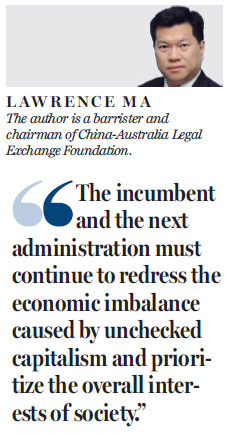Proactive fiscal policy is needed to redress unchecked capitalism
Updated: 2016-07-05 07:40
By Lawrence Ma(HK Edition)
|
|||||||||
The emergence of localism and separatist ideas in Hong Kong has highlighted some political problems that actually have their roots in economic problems. There is a feeling among some quarters of the community that Hong Kong's grassroots and middle class have not benefited from some economic policies as much as other quarters; and to some extent this might be true. Take for example the Individual Visit Scheme (IVS), a policy introduced after the 2003 SARS epidemic to support Hong Kong's ailing economy. Retail sales, hotel occupancy and restaurant businesses have been significantly boosted by the scheme. But the IVS has benefited certain sectors - which are dominated by big businesses - much more than others. The poor did benefit from the scheme but their share was disproportionately small. The employees of these beneficiary businesses such as sales representatives, hotel staff and restaurant servants have not benefited significantly from the scheme.

Under the capitalist system which Hong Kong has strived to preserve, the city has achieved great economic success but most of the business profits have been reaped by property developers and landlords, who always factor commercial tenants' profits into their rental formula. The more the commercial tenants earn, the more rent they pay to the landlords. This is supposed to be part of the "high risk, high return" notion popularly held in a free market capitalist economy. In the meantime, while salaries of employees have every now and then been raised to beat inflation, returns on capital have always outrun salary increments. The employees therefore barely feel the direct impact of successful economic policies.
The capitalist system intrinsically allows the disadvantaged groups to be legally exploited. As a result of years of unchecked capitalism, the wealth gap in Hong Kong has widened considerably, with a Gini coefficient hovering on the top of the global rankings. The polarization of wealth has led to social divides and caused some deep-seated problems or conflicts.
The government's fiscal and taxation policies can play a significant role in redressing such economic imbalance or deep-seated conflicts. Many feel that the previous government has not done enough to redress the economic imbalance.
One possible solution that can help correct the wealth imbalance would be to tax the rich at higher rates or progressive tax rates. The additional revenues would be used to subsidize the poor and the lower middle class. Li Ka-shing, chairman of CK Hutchison Holdings, suggested a few days ago that the government would do better to raise the profits tax rates rather than impose a tax on the rich alone. He has a point. Imposing a tax specifically targeting the rich could prove to be a disincentive to economic activities and create chaos; whereas big companies paying a few extra percentage points of tax would not be much of a political issue. Corporate profits tax has been set at 16.5 percent and for the fiscal year 2014-15 the government collected HK$137.8 billion in revenue from profits tax. As at 2013, there were 1.02 million people who lived below the poverty line; and for them to be lifted above the poverty line, HK$14.8 billion would be needed. Based on the figures for fiscal year 2014-15, a 2 percent increase in the profits tax rate would bring in an extra HK$16.7 billion of revenue, which would be more than enough to lift every Hong Kong person out of poverty.
The current administration under Chief Executive Leung Chun-ying has introduced serious measures to redress the economic imbalance, e.g. by establishing the Commission on Poverty and the Community Care Fund to directly benefit the poor that fall outside the social security net. However, a continuous and proactive fiscal approach must be taken to ensure direct financial benefits reach the hands of the working poor and the needy, rather than giving out "free lunches". In any event, the incumbent and the next administration must continue to redress the economic imbalance caused by unchecked capitalism and prioritize the overall interests of society.
The separatist ideas and discourse in Hong Kong arose from social discontent - particularly from the underprivileged and grassroots - over the imbalance in the distribution of economic benefits. In this sense, when the Belt and Road Initiative benefits Hong Kong in any way, the SAR government had better find a way to ensure that the poor and the underprivileged get a fair share of it.
(HK Edition 07/05/2016 page8)